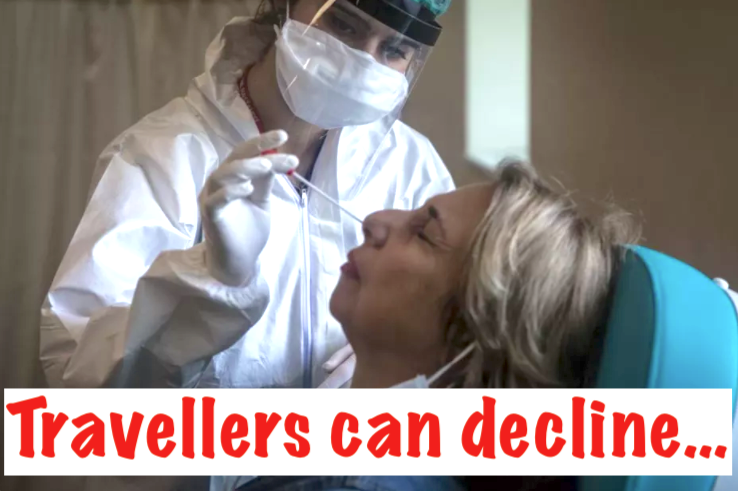

Travellers May Decline the PCR Test If You Want To
Important INFO For Travellers re PCR Test
The Quarantine Act (Canada), which authorizes taking of PCR tests on “travellers”, PROHIBITS ANY testing process that “involves the entry into the traveller’s body of any instrument or other foreign body.“
You may honourably and lawfully say “I respectfully decline your invitation to voluntarily submit to… nasal swab, mouth swab, needles (and no anal swabs)!”
Quarantine Act, SC 2005, c 20, <https://canlii.ca/t/54b27>
Screening technology
14 (1) Any qualified person authorized by the Minister may, to determine whether a traveller has a communicable disease or symptoms of one, use any screening technology authorized by the Minister that does not involve the entry into the traveller’s body of any instrument or other foreign body.
That was pretty straightforward…but lets get rid of the excess words:
“…may… use any screening technology… that does not involve the entry into the traveller’s body of any instrument or other foreign body”
It could be said another way… may not use any screening technology that involves the entry into the body of any instrument or other foreign body – ie. nasal swab, anal swab, needle etc.
Got it?
Do you have a claim for having a PCR test done to you already? Well, maybe. BUT you did “consent to the offer to do an invasive test” as far as THEY are concerned (even though they lie, intimidated, cajoled, threatened you). It’s the dirty dirty game THEY play.
Let’s go even deeper on this dive into the ‘sea of commerce’ legalese to see what else we can discover…
Are you even a “person” under the Act?
- Does use of “including” limit “person” to “operator of a conveyance” and limit “other means of transportation” to “cargo container“?
- Does “and includes” limit operator to “conveyance crew“?
- What exactly is “Canada“? How can you be deemed to be “in Canada“? Is Canada a physical geographic area or a legal/political/corporate fiction?
- What exactly is a motor vehicle? Usually, it means private property automobile registered under Motor Vehicle Act…
Definitions from the Act
traveller means a person, including the operator of a conveyance, who arrives in Canada or is in the process of departing from Canada. (voyageur)
conveyance means a watercraft, aircraft, train, motor vehicle, trailer or other means of transportation, including a cargo container, that arrives in Canada or is in the process of departing from Canada. (véhicule)
operator means any person in charge of a conveyance, and includes the conveyance crew. (conducteur)
If that is too wonky, detailed legalease for you just stick the simple position:
THEY cannot use “any screening technology” “that involves the entry into the traveller’s body of any instrument or other foreign body.”
other things of note….
Quarantine Act, SC 2005, c 20, <https://canlii.ca/t/54b27>
Obligation on arriving travellers
12 Every person who is subject to subsection 11(1) of the Customs Act and enters Canada shall, immediately after entering, present themselves to a screening officer at the nearest entry point.
Obligation on departing travellers
13 Every person who leaves Canada through a departure point shall, immediately before leaving, present themselves to a screening officer or quarantine officer at the departure point.
…
Duty to provide information
15 (1) Every traveller shall answer any relevant questions asked by a screening officer or quarantine officer and provide to the officer any information or record in their possession that the officer may reasonably require in the performance of a duty under this Act.
Right to review
29 (1) The quarantine officer shall immediately inform a traveller detained under subsection 28(1) of their right to a review of the confirmation of detention.
…
Review by Minister
30 The Minister may, on the Minister’s own motion, review any decision of a quarantine officer to detain a traveller and, if the Minister is of the opinion that the traveller does not pose a risk of significant harm to public health, order the traveller’s release.
Mandatory application for court order
31 (1) If a quarantine officer detains a traveller referred to in paragraph 28(1)(a), (c), (e) or (f), or a traveller referred to in paragraph 28(1)(b) who has refused to undergo the medical examination, the quarantine officer shall, as soon as reasonably practicable, apply to a judge of the superior court of the province in which the traveller is detained, or to a judge of the Federal Court, for an order requiring the traveller
(a) to submit to a health assessment;
(b) to submit to a medical examination;
(c) to be treated;
(d) to be disinfested; or
(e) to undergo any other measure for preventing or controlling the spread of a communicable disease.
….
Release
32 A quarantine officer shall not detain a traveller if
(a) the quarantine officer has reasonable grounds to believe that the traveller does not pose a risk of significant harm to public health;
(b) the traveller is transferred to a public health authority under section 33;
(c) the release of the traveller is ordered under subsection 29(6) or section 30; or
(d) the quarantine officer has reasonable grounds to believe that other reasonable means are available to prevent or control a risk of significant harm to public health.
…
Notice to provincial public health authority
33.1 (1) As soon as practicable, a quarantine officer shall inform the provincial public health authority of any province concerned if
(a) the quarantine officer has required a traveller to undergo a medical examination under subsection 22(1);
(b) the quarantine officer has ordered the traveller to comply with treatment or any other measure under section 26;
(c) a peace officer has arrested a traveller and taken them to the quarantine officer under section 27;
(d) the quarantine officer is detaining a traveller under subsection 28(1); or
(e) the quarantine officer does not detain a traveller, for the reasons set out in paragraph 32(d).
…
Officers, etc., of corporations
73 (1) If a corporation commits an offence under this Act, any officer, director or agent or mandatary of the corporation who directed, authorized, assented to, acquiesced in or participated in the commission of the offence is a party to, and guilty of, the offence and liable on conviction to the punishment provided for the offence, whether or not the corporation has been prosecuted or convicted.
Duty to ensure compliance
(2) Every director and officer of a corporation shall take all reasonable care to ensure that the corporation complies with this Act and the regulations.
Offence by employee or agent or mandatary
74 In a prosecution for an offence under this Act, it is sufficient proof of the offence to establish that it was committed by an employee or agent or mandatary of the accused, whether or not the employee or agent or mandatary is identified or has been prosecuted for the offence, unless the accused establishes that
(a) the offence was committed without the accused’s knowledge or consent; and
(b) the accused exercised all due diligence to prevent its commission.
